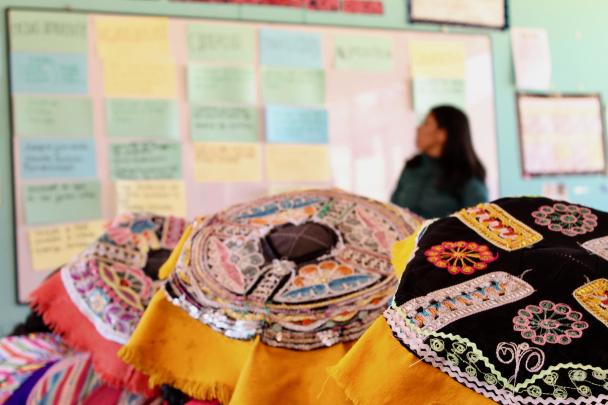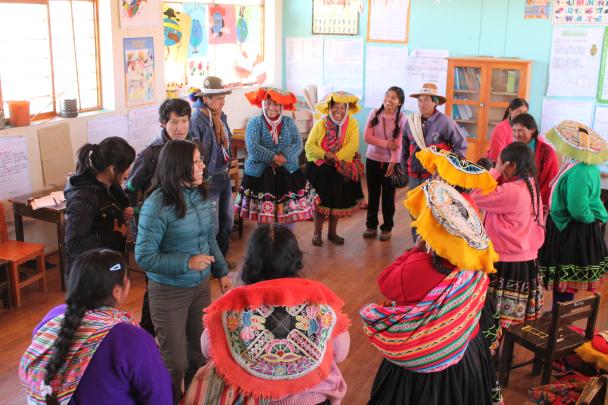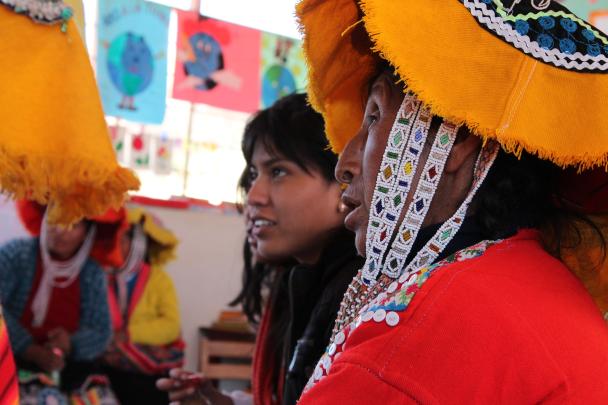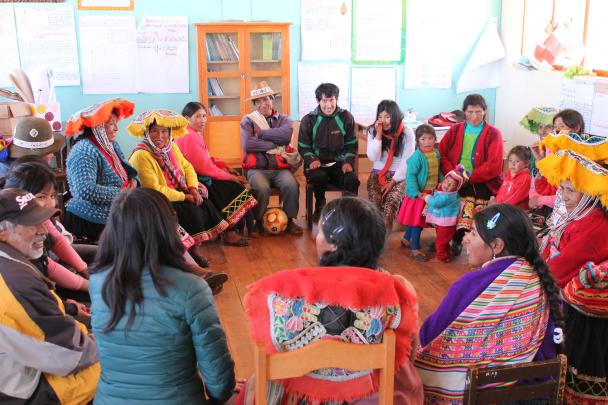The Transitions Research Institute brings together scholars from the humanities and social sciences to explore the major transformations shaping contemporary societies. In the face of environmental, democratic, economic, health, and social challenges, our models of development, our institutions, and our ways of living together are being fundamentally rethought.
The Institute’s research focuses on key areas such as the environment, politics, law, justice, social cohesion, food systems, development, education, and vulnerabilities. Drawing on critical approaches and combining disciplinary, interdisciplinary, and transdisciplinary perspectives, the Transitions Institute aims to deepen understanding of today’s pressing issues while actively contributing to change on the ground.
Recognized nationally and internationally (F.R.S.-FNRS, European Union, Federal Government, Walloon Region, etc.), members of the Institute develop both fundamental research and action-oriented projects designed to serve society.

The Institute is currently structured around four main entities:
- Democratic Transformations Cluster
Focuses on the evolution of political systems, electoral representation, forms of citizen participation, and democratic legitimacy.
(Permanent members: Arthur Borriello, Jérémy Dodeigne, and Vincent Jacquet) - Territorial and Environmental Transformations Cluster
Takes a systemic view of the relationships between humans and nature, promoting participatory and locally grounded approaches to support socio-ecological transformations at the territorial level.
(Permanent members: Nicolas Dendoncker and Johan Yans) - Life Course and Transitions Cluster
Examines how life trajectories are being reshaped, highlighting the impact of public policies on individual and collective vulnerabilities.
(Permanent member: Nathalie Burnay) - Vulnerabilities and Societies Centre
Explores, through an interdisciplinary approach, contemporary forms of vulnerability within businesses, the state, and families, as well as the transformations in law resulting from these changes.
(Permanent members: Géraldine Mathieu, Stéphanie Wattier, Marc Nihoul, and Nathalie Basecqz)
Spotlight
News

28 new research projects funded by the FNRS
28 new research projects funded by the FNRS
The F.R.S.-FNRS has just published the results of its various 2025 calls for proposals. These include the "Credits & Projects" and "WelCHANGE" calls, as well as the "FRIA" (Fund for Research Training in Industry and Agriculture) and "FRESH" (Fund for Research in the Humanities) calls, which aim to support doctoral theses. What are the results for UNamur? Twenty-eight projects have been selected, demonstrating the quality and richness of research at UNamur.

The "Credits & Projects" call for proposals resulted in 12 grants being awarded for ambitious new projects. These include two "equipment" grants, eight "research credits (CDR)" grants, and two "research projects (PDR)" grants, one of which is in collaboration with the ULB. The FRIA call for doctoral research support will fund eleven doctoral scholarships and the FRESH call will fund three.
Two prestigious Scientific Impulse Mandates (MIS) were also obtained. This three-year funding supports young permanent researchers who wish to develop an original and innovative research program by acquiring scientific autonomy within their department.
We would also like to highlight the two projects funded under the "WelCHANGE" call, a funding instrument for research projects with potential societal impact, led by a principal investigator in the humanities and social sciences.
Detailed results
Call for Equipment
- Xavier De Bolle, Narilis Institute, Co-promoter in collaboration with UCLouvain
- Luca Fusaro, NISM Institute
Call for Research Grants (CDR)
- Marc Hennequart, NARILIS Institute
- Nicolas Gillet, NARILIS Institute
- Jean-Yves Matroule, NARILIS Institute
- Patricia Renard, NARILIS Institute
- Francesco Renzi, NARILIS Institute
- Stéphane Vincent, NISM Institute
- Laurence Meurant, NaLTT Institute
- Emma-Louise Silva, NaLTT Institute
Call for Research Projects (PDR)
- Jérémy Dodeigne, Transitions Institute, Co-supervisor in collaboration with ULB
- Luc Henrard, NISM Institute; Co-supervisor: Yoann Olivier, NISM Institute
Fund for Training in Research in Industry and Agriculture (FRIA)
- Emma Bongiovanni - Supervisor: Catherine Michaux, NISM Institute
- Simon Chabot - Supervisor: Carine Michiels, Narilis Institute; Co-supervisor: Anne-Catherine Heuskin, Narilis Institute
- Lee Denis - Supervisor: Muriel Lepère, ILEE Institute
- Maé Desclez - Supervisor: Johan Yans, ILEE Institute; Co-supervisor: Hamed Pourkhorsandi (University of Toulouse)
- Pierre Lombard - Supervisor: Benoît Muylkens, Narilis Institute; Co-supervisor: Damien Coupeau, Narilis Institute
- Amandine Pecquet - Supervisor: Nicolas Gillet, Narilis Institute; Co-supervisor: Damien Coupeau, Narilis Institute
- Kilian Petit - Supervisor: Henri-François Renard, Narilis Institute; Co-supervisor: Xavier De Bolle, Narilis Institute
- Simon Rouxhet - Supervisor: Catherine Michaux, NISM Institute; Co-supervisor: Nicolas Gillet, Narilis Institute
- William Soulié - Supervisor: Yoann Olivier, NISM Institute
- Elisabeth Wanlin - Supervisor: Xavier De Bolle, Narilis Institute
- Laura Willam - Supervisor: Frédérik De Laender, ILEE Institute
Fund for Research in the Humanities (FRESH)
- Louis Droussin - Supervisor: Arthur Borriello, Transitions Institute; Co-supervisor: Vincent Jacquet, Transitions Institute
- Nicolas Larrea Avila - Supervisor: Guilhem Cassan, DeFIPP Institute
- Victor Sluyters – Supervisor: Wafa Hammedi, NADI Institute
- Amandine Leboutte - Co-supervisor: Erika Wauthia (UMons); Co-supervisor: Cédric Vanhoolandt, IRDENa Institute.
Scientific Impulse Mandate (MIS)
- Charlotte Beaudart, Narilis Institute
- Eli Thoré ILEE Institute
WelCHANGE Call
- Nathalie Burnay Transitions Institute, in collaboration with UCLouvain
- Catherine Guirkinger, DeFIPP Institute
Congratulations to all!
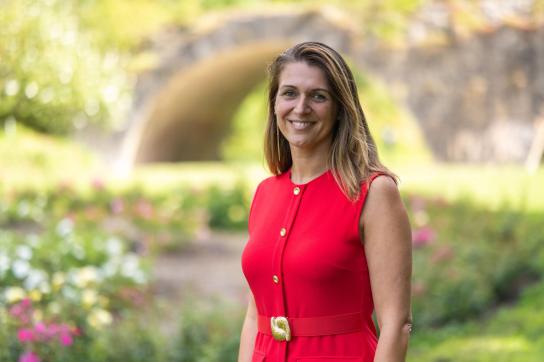
Is there a doctor in the village? Analysis by a sociologist
Is there a doctor in the village? Analysis by a sociologist
The lack of primary care is a major public health issue. In 2022, it was estimated that 52 municipalities in French-speaking Belgium were facing a severe shortage of general practitioners. This is a worrying situation that the University Observatory for Rural Medicine (OUMRu) has been addressing since 2023, with the aim of identifying concrete solutions. Working alongside a doctor and a health geographer, Amélie Pierre, a sociologist and lecturer at the Faculty of Economics, Management and Communication SciencesPo (EMCP), is studying the factors that influence access to healthcare, particularly from the patients' point of view. She emphasizes the need to take into account the realities experienced by vulnerable groups.
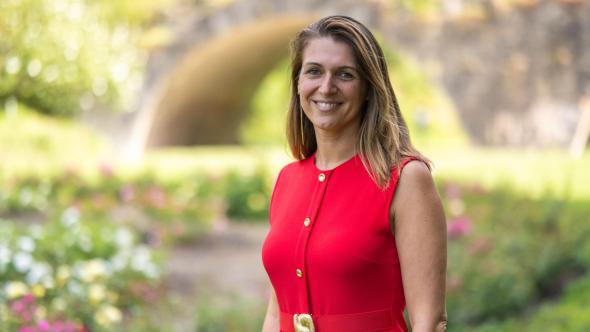
What is your role within the UNamur University Observatory for Rural Medicine (OUMRu)?
I am working on the issue of access to healthcare. Together with Dr. Dominique Henrion, we have collaborated on an initial collection of quantitative data via "The Social Study" program involving 5,000 Belgian citizens. This first step aims to objectively assess the difficulties encountered in the field and identify geographical variations. The initial results show that we are in a tense situation. In a second qualitative phase, we are examining how the profession and the care relationship have evolved in this context. The vision of the profession and professional practices have changed profoundly. I am particularly interested in characteristics such as precariousness, age, gender, and health status. These characteristics reveal differences within the patient population. If you are socially isolated, in a precarious situation, and suffering from serious or chronic conditions, this shortage has a significant impact. Take palliative care, for example: the situation is currently serious in some areas, and doctors are no longer systematically able to meet needs.
What explains this shortage?
The profession of general practitioner has changed significantly in recent years. We are seeing that the new generation of doctors is more inclined to set up practice in cities, which offer different working conditions. Young doctors entering the job market do not have the same vision of the profession as doctors nearing the end of their careers. Issues of age and gender also have a strong impact on the evolution of the profession. These young doctors are no longer necessarily going to devote themselves body and soul to their work. They are seeking a different balance between their private and professional lives. Another aspect is tending to disappear: the availability of family doctors at all hours and home visits. Today, the system of shared on-call duties is the norm, and doctors are no longer on call at all times. We must therefore assume that the profession has changed.
This project brings together expertise in medicine, geography, and sociology. What do you see as the added value of this multidisciplinary collaboration?
This collaboration is extremely fruitful, thanks to the diversity of our respective expertise and backgrounds. The sociological perspective allows us to understand the experiences, meaning, and practices of general medicine in rural areas. The aim is to understand the role of the family doctor in patient health and the changing vision of the profession. In geography, Catherine Linard is conducting quantitative research with a particular focus on the discipline's interest in territory. This work aims to create a "rurality index" to identify where general practitioners are located. The expertise of medicine is to work, from there, on the attractiveness of locations in particular. In general, the applied dimension of the project appeals to me greatly, and it is the observatory's role to analyze the situation with a view to taking action. There is an urgent need to understand this phenomenon, which is felt by the entire population and experienced particularly acutely by people in vulnerable situations.
Are solutions already being considered?
Interdisciplinarity is very rich in this regard. In particular, through the links between the Observatory and the master's degree in general medicine, Dominique Henrion seeks to identify the priorities of future doctors in order to see how to act on the locations where they will practice to correct the current imbalances. The interdisciplinary supervision of a doctoral student, funded by the Christian Mutual Insurance Company as part of an FSR, will also enable us to make progress in this area (see box).
You also conduct research in the sociology of work and gerontology, which is the study of aging. What is your approach to your work?
I am part of the critical gerontology movement, which questions the social structures that weigh on older people. For example, the increase in the retirement age reflects a tendency to have to and want to remain active, in order to maintain a certain standard of living, but also to continue to participate in society. I am working with Nathalie Burnay, professor at the EMCOP Faculty, on an FNRS project co-funded by the Swiss National Science Foundation, which compares how work is experienced and perceived by aging people after retirement age. This raises questions related to the end of life and how individuals rethink their identity in light of social norms that are quite ageist and value activity. This four-year collaboration is part of the projects I am conducting at the Transitions Institute, which explore the restructuring of social roles throughout life, particularly through the prism of inequalities and helping relationships, issues that are also addressed in the work carried out by the OUMRu.
Express resume
Amélie Pierre holds a PhD in political and social sciences. She is a lecturer at UNamur and a postdoctoral researcher at the Transitions Institute, in the Transitions and Life Stages Division. She is head of the CERIAS Research Center for the Master's in Engineering and Social Action at Henallux and HELHa. She is interested in normativities and changes in individuals' identities over the course of their lives, particularly among minority groups in relation to disability, age, or precariousness.
An unprecedented collaboration
UNamur and Mutualité chrétienne have entered into an unprecedented partnership within the framework of OUMRu. This partnership involves the co-financing of an ambitious, multidisciplinary research project led by UNamur over a four-year period, under the direction of Amélie Pierre and Catherine Linard, with a view to deciphering the mechanisms contributing to the disparity in the provision of general medical care in Wallonia and objectively assessing shortages at the local level.
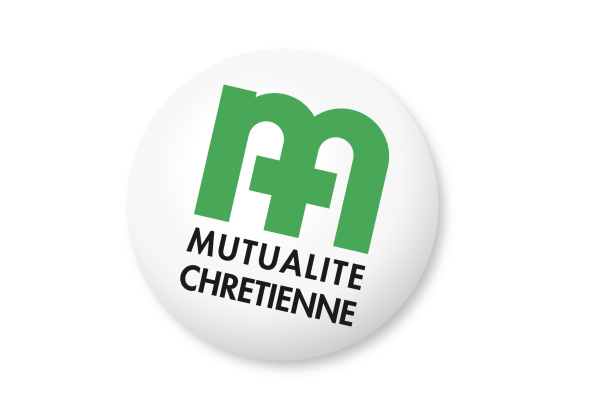
Cet article est tiré de la rubrique "Le jour où" du magazine Omalius #38 (Septembre 2025).
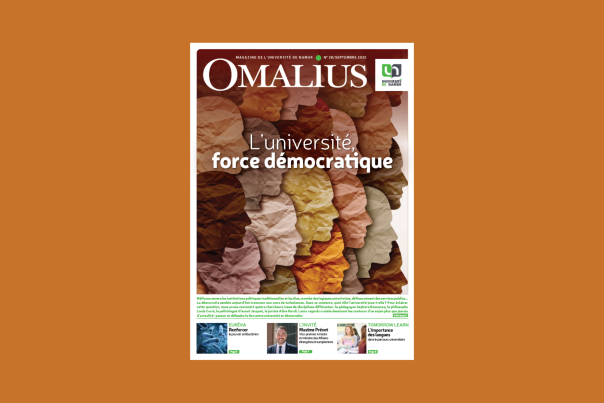
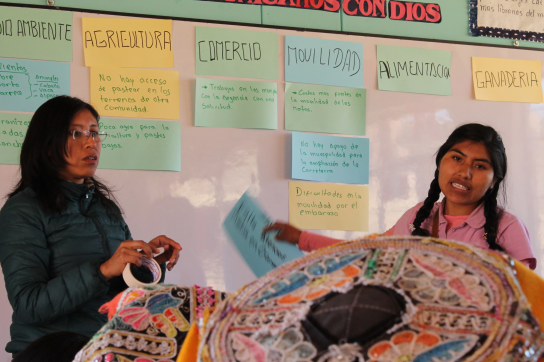
UNamur in South America
UNamur in South America
South America is a subcontinent rich in natural and cultural resources. Between biodiversity preservation and development cooperation, UNamur maintains valuable partnerships to address the challenges of biodiversity loss and understand current socio-economic transformations. Immersion in Ecuador and Peru.
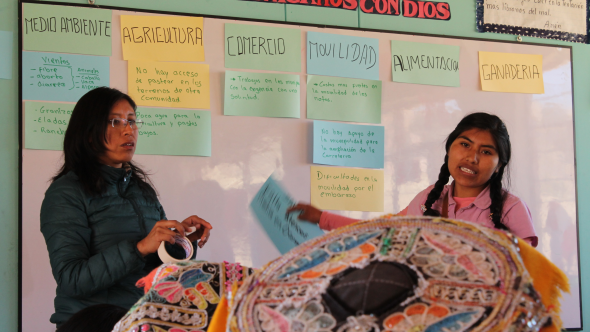
Strategically located at the intersection of the Andes mountain range, the Amazon rainforest, and the Galápagos Islands (made famous by a certain Charles Darwin), Ecuador is a hotspot of biodiversity. More than 150 years after the naturalist's observations, this country remains a popular field of study for scientists investigating how wild organisms adapt to changes in their environment.
Ecuador as an open-air laboratory
As part of a two-year project funded by the ARES International Cooperation Commission (ARES-CCI), Professors Frédéric Silvestre and Alice Dennis from the Environmental and Evolutionary Biology Research Unit (URBE) at UNamur have formed a partnership with the Universidad Central Del Ecuador. The goal? To apply the genetic and epigenetic techniques developed in the Namur laboratories to fish and macroinvertebrates in Ecuadorian streams.

"Genetic and epigenetic marks on genes provide valuable information about the environmental stresses experienced by wild populations."
An initial sampling campaign was conducted this summer, and another is planned for next spring, with Frédéric Silvestre and Alice Dennis participating. This collaboration also enabled URBE to welcome an Ecuadorian researcher who came to train in nanopore sequencing techniques, used in this project, and to carry out tests on samples of the species studied. Nanopore sequencing is a method of sequencing long DNA strands using an electrical signal. "This technique is very advantageous because it facilitates genome assembly and allows us to work on both the DNA sequence and its modifications. Nanopore sequencing also uses very small, portable equipment that is easy to use in the field," the researcher continues. The aim of using this technology is to demonstrate the feasibility of this process and, ultimately, to contribute to the development of more effective biodiversity conservation policies based on concrete genetic data.
Peru: Understanding the dynamics of a country undergoing rapid change
Newly appointed Vice-Rector for International and External Relations at UNamur, Stéphane Leyens is involved in no fewer than four projects in Peru, working closely with the Universidad Nacional San Antonio Abad del Cusco (UNSAAC). Located in the Andes mountain range at an altitude of nearly 3,500 meters, this university has been receiving support from the ARES International Cooperation Commission (ARES-CCI) since 2009 to improve the quality of its teaching and strengthen its research capabilities. These projects are set against the backdrop of the new "university law," which has profoundly changed the landscape of higher education by emphasizing teacher training and the social responsibility of universities, which are now encouraged to integrate issues such as interculturality, the environment, and gender into a local rural development perspective.
It must be said that the country's cultural, political, and socioeconomic context is undergoing profound change. As a result, rural communities are torn between their attachment to traditional lifestyles and the appeal of the economic opportunities offered by the modernization of agriculture or the growth of tourism.
It is this tension that Stéphane Leyens is studying in the district of Ocongate (department of Cuzco), located on the route of the Southern Interoceanic Highway. "This paved road, connecting Lima to Sao Paulo and completed in 2006, has completely transformed the community and socio-economic dynamics of the Quechua populations of the high Andes, providing access to the mines of the Amazon, urban markets, higher education institutions, and opening up the region to tourism. The idea was therefore to study this change in dynamics through the prism of family and community decision-making, with a particular focus on education, agricultural activities, and gender issues," explains Stéphane Leyens. These questions—which particularly resonate with the realities experienced by the population—led to two doctoral research projects conducted by Peruvian researchers.
In the same vein, and in a brand new project, the researcher is looking at the impact of the development of informal mining operations on the local economy from an original angle: Quechua epistemology. This project is based on a partnership with a team from the Universidad Nacional José María Arguedas (UNAJMA), which specializes in this approach.

"The rise of informal mining has destabilized family dynamics, with mining activities becoming increasingly male-dominated and agricultural work increasingly female-dominated within communities. To analyze these changes, we start from the framework of thought of the Quechua-speaking farming communities: their mythologies, their conceptions of their relationship to the land and nature, to the community, etc."
Feedback from a student
"As part of the Master's degree in physics, we are required to do an internship in Belgium or elsewhere. I chose to fly to Brazil because local researchers are conducting research related to my thesis topic. It was also an opportunity to step out of my comfort zone and experience life in a distant country.
It went very well, both academically and personally. I had the opportunity to help write an article and follow the entire publication process. The work was very loosely organized, and I was able to conduct my research independently. I quickly formed lasting friendships, particularly by participating in forró classes, a Brazilian dance.
If I had one piece of advice to give, it would be: go for it! Going far away can be scary, but it teaches you a lot, especially the fact that you are capable of bouncing back in sometimes unpredictable situations."
- Thaïs Nivaille, physics student
This article is taken from the "Far away" section of Omalius magazine #38 (September 2025).

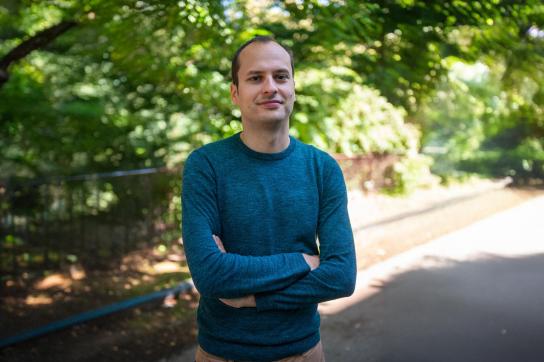
Citizens' assemblies: gimmicks or levers for change?
Citizens' assemblies: gimmicks or levers for change?
For the past fifteen years or so, participatory and deliberative democracy mechanisms have been multiplying: participatory budgets, popular consultations, citizens' panels, and so on. Vincent Jacquet, a political scientist and coordinator of the European research project Citizen Impact (ERC project, European Research Council), studies the impact of these devices from the point of view of governors and citizens.
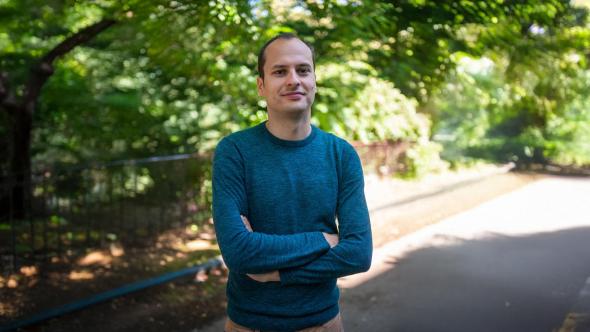
The findings are nuanced: "Unsurprisingly, today's elected representatives are very much rooted in an electoral and representative logic. Many are wary of citizens' ability to get involved beyond electoral processes. Obviously, there are differences between elected representatives and political parties. To simplify, we can say that the further left a party is and the younger its elected representatives are, the more open they will be to extra-electoral mechanisms", explains Vincent Jacquet.
So, the question is whether those in power are really integrating these citizen processes into their political decisions. "In politics, things change slowly. So it's not surprising that we're not seeing major reforms in the short term. But that doesn't mean the results aren't taken into account," nuances the political scientist. In some cases, the recommendations of citizens' assemblies feed into public policy. In others, they go unheeded. He points out, however, that the lack of impact has less to do with a desire for manipulation on the part of elected officials, than with the fact that participation is thought of alongside decision-making circuits.
To strengthen their impact, three levers are identified by the researcher:
- Inscribe assemblies over time to feed public action over the long term.
- Define upstream the timetable and the way in which decisions will be made in relation to citizens' recommendations.
- Guarantee support for the recommendations by politics or civil society.
The Irish example is often cited. Citizens' assemblies paved the way for referendums on marriage for all and abortion. "It was the interaction between the deliberations of an assembly drawn by lot, social mobilization and the organization of a referendum that enabled these reforms to be carried through."
A reminder that these devices do not replace representative democracy, but can enrich it, provided they do not remain at the symbolic stage.
On the same subject
An academic year focused on democracy
Find the speech delivered by Rectrice Annick Castiaux at the 2025-2026 Academic Back-to-School Ceremony.

Cet article est tiré de la rubrique "Le jour où" du magazine Omalius #38 (Septembre 2025).


28 new research projects funded by the FNRS
28 new research projects funded by the FNRS
The F.R.S.-FNRS has just published the results of its various 2025 calls for proposals. These include the "Credits & Projects" and "WelCHANGE" calls, as well as the "FRIA" (Fund for Research Training in Industry and Agriculture) and "FRESH" (Fund for Research in the Humanities) calls, which aim to support doctoral theses. What are the results for UNamur? Twenty-eight projects have been selected, demonstrating the quality and richness of research at UNamur.

The "Credits & Projects" call for proposals resulted in 12 grants being awarded for ambitious new projects. These include two "equipment" grants, eight "research credits (CDR)" grants, and two "research projects (PDR)" grants, one of which is in collaboration with the ULB. The FRIA call for doctoral research support will fund eleven doctoral scholarships and the FRESH call will fund three.
Two prestigious Scientific Impulse Mandates (MIS) were also obtained. This three-year funding supports young permanent researchers who wish to develop an original and innovative research program by acquiring scientific autonomy within their department.
We would also like to highlight the two projects funded under the "WelCHANGE" call, a funding instrument for research projects with potential societal impact, led by a principal investigator in the humanities and social sciences.
Detailed results
Call for Equipment
- Xavier De Bolle, Narilis Institute, Co-promoter in collaboration with UCLouvain
- Luca Fusaro, NISM Institute
Call for Research Grants (CDR)
- Marc Hennequart, NARILIS Institute
- Nicolas Gillet, NARILIS Institute
- Jean-Yves Matroule, NARILIS Institute
- Patricia Renard, NARILIS Institute
- Francesco Renzi, NARILIS Institute
- Stéphane Vincent, NISM Institute
- Laurence Meurant, NaLTT Institute
- Emma-Louise Silva, NaLTT Institute
Call for Research Projects (PDR)
- Jérémy Dodeigne, Transitions Institute, Co-supervisor in collaboration with ULB
- Luc Henrard, NISM Institute; Co-supervisor: Yoann Olivier, NISM Institute
Fund for Training in Research in Industry and Agriculture (FRIA)
- Emma Bongiovanni - Supervisor: Catherine Michaux, NISM Institute
- Simon Chabot - Supervisor: Carine Michiels, Narilis Institute; Co-supervisor: Anne-Catherine Heuskin, Narilis Institute
- Lee Denis - Supervisor: Muriel Lepère, ILEE Institute
- Maé Desclez - Supervisor: Johan Yans, ILEE Institute; Co-supervisor: Hamed Pourkhorsandi (University of Toulouse)
- Pierre Lombard - Supervisor: Benoît Muylkens, Narilis Institute; Co-supervisor: Damien Coupeau, Narilis Institute
- Amandine Pecquet - Supervisor: Nicolas Gillet, Narilis Institute; Co-supervisor: Damien Coupeau, Narilis Institute
- Kilian Petit - Supervisor: Henri-François Renard, Narilis Institute; Co-supervisor: Xavier De Bolle, Narilis Institute
- Simon Rouxhet - Supervisor: Catherine Michaux, NISM Institute; Co-supervisor: Nicolas Gillet, Narilis Institute
- William Soulié - Supervisor: Yoann Olivier, NISM Institute
- Elisabeth Wanlin - Supervisor: Xavier De Bolle, Narilis Institute
- Laura Willam - Supervisor: Frédérik De Laender, ILEE Institute
Fund for Research in the Humanities (FRESH)
- Louis Droussin - Supervisor: Arthur Borriello, Transitions Institute; Co-supervisor: Vincent Jacquet, Transitions Institute
- Nicolas Larrea Avila - Supervisor: Guilhem Cassan, DeFIPP Institute
- Victor Sluyters – Supervisor: Wafa Hammedi, NADI Institute
- Amandine Leboutte - Co-supervisor: Erika Wauthia (UMons); Co-supervisor: Cédric Vanhoolandt, IRDENa Institute.
Scientific Impulse Mandate (MIS)
- Charlotte Beaudart, Narilis Institute
- Eli Thoré ILEE Institute
WelCHANGE Call
- Nathalie Burnay Transitions Institute, in collaboration with UCLouvain
- Catherine Guirkinger, DeFIPP Institute
Congratulations to all!

Is there a doctor in the village? Analysis by a sociologist
Is there a doctor in the village? Analysis by a sociologist
The lack of primary care is a major public health issue. In 2022, it was estimated that 52 municipalities in French-speaking Belgium were facing a severe shortage of general practitioners. This is a worrying situation that the University Observatory for Rural Medicine (OUMRu) has been addressing since 2023, with the aim of identifying concrete solutions. Working alongside a doctor and a health geographer, Amélie Pierre, a sociologist and lecturer at the Faculty of Economics, Management and Communication SciencesPo (EMCP), is studying the factors that influence access to healthcare, particularly from the patients' point of view. She emphasizes the need to take into account the realities experienced by vulnerable groups.

What is your role within the UNamur University Observatory for Rural Medicine (OUMRu)?
I am working on the issue of access to healthcare. Together with Dr. Dominique Henrion, we have collaborated on an initial collection of quantitative data via "The Social Study" program involving 5,000 Belgian citizens. This first step aims to objectively assess the difficulties encountered in the field and identify geographical variations. The initial results show that we are in a tense situation. In a second qualitative phase, we are examining how the profession and the care relationship have evolved in this context. The vision of the profession and professional practices have changed profoundly. I am particularly interested in characteristics such as precariousness, age, gender, and health status. These characteristics reveal differences within the patient population. If you are socially isolated, in a precarious situation, and suffering from serious or chronic conditions, this shortage has a significant impact. Take palliative care, for example: the situation is currently serious in some areas, and doctors are no longer systematically able to meet needs.
What explains this shortage?
The profession of general practitioner has changed significantly in recent years. We are seeing that the new generation of doctors is more inclined to set up practice in cities, which offer different working conditions. Young doctors entering the job market do not have the same vision of the profession as doctors nearing the end of their careers. Issues of age and gender also have a strong impact on the evolution of the profession. These young doctors are no longer necessarily going to devote themselves body and soul to their work. They are seeking a different balance between their private and professional lives. Another aspect is tending to disappear: the availability of family doctors at all hours and home visits. Today, the system of shared on-call duties is the norm, and doctors are no longer on call at all times. We must therefore assume that the profession has changed.
This project brings together expertise in medicine, geography, and sociology. What do you see as the added value of this multidisciplinary collaboration?
This collaboration is extremely fruitful, thanks to the diversity of our respective expertise and backgrounds. The sociological perspective allows us to understand the experiences, meaning, and practices of general medicine in rural areas. The aim is to understand the role of the family doctor in patient health and the changing vision of the profession. In geography, Catherine Linard is conducting quantitative research with a particular focus on the discipline's interest in territory. This work aims to create a "rurality index" to identify where general practitioners are located. The expertise of medicine is to work, from there, on the attractiveness of locations in particular. In general, the applied dimension of the project appeals to me greatly, and it is the observatory's role to analyze the situation with a view to taking action. There is an urgent need to understand this phenomenon, which is felt by the entire population and experienced particularly acutely by people in vulnerable situations.
Are solutions already being considered?
Interdisciplinarity is very rich in this regard. In particular, through the links between the Observatory and the master's degree in general medicine, Dominique Henrion seeks to identify the priorities of future doctors in order to see how to act on the locations where they will practice to correct the current imbalances. The interdisciplinary supervision of a doctoral student, funded by the Christian Mutual Insurance Company as part of an FSR, will also enable us to make progress in this area (see box).
You also conduct research in the sociology of work and gerontology, which is the study of aging. What is your approach to your work?
I am part of the critical gerontology movement, which questions the social structures that weigh on older people. For example, the increase in the retirement age reflects a tendency to have to and want to remain active, in order to maintain a certain standard of living, but also to continue to participate in society. I am working with Nathalie Burnay, professor at the EMCOP Faculty, on an FNRS project co-funded by the Swiss National Science Foundation, which compares how work is experienced and perceived by aging people after retirement age. This raises questions related to the end of life and how individuals rethink their identity in light of social norms that are quite ageist and value activity. This four-year collaboration is part of the projects I am conducting at the Transitions Institute, which explore the restructuring of social roles throughout life, particularly through the prism of inequalities and helping relationships, issues that are also addressed in the work carried out by the OUMRu.
Express resume
Amélie Pierre holds a PhD in political and social sciences. She is a lecturer at UNamur and a postdoctoral researcher at the Transitions Institute, in the Transitions and Life Stages Division. She is head of the CERIAS Research Center for the Master's in Engineering and Social Action at Henallux and HELHa. She is interested in normativities and changes in individuals' identities over the course of their lives, particularly among minority groups in relation to disability, age, or precariousness.
An unprecedented collaboration
UNamur and Mutualité chrétienne have entered into an unprecedented partnership within the framework of OUMRu. This partnership involves the co-financing of an ambitious, multidisciplinary research project led by UNamur over a four-year period, under the direction of Amélie Pierre and Catherine Linard, with a view to deciphering the mechanisms contributing to the disparity in the provision of general medical care in Wallonia and objectively assessing shortages at the local level.

Cet article est tiré de la rubrique "Le jour où" du magazine Omalius #38 (Septembre 2025).


UNamur in South America
UNamur in South America
South America is a subcontinent rich in natural and cultural resources. Between biodiversity preservation and development cooperation, UNamur maintains valuable partnerships to address the challenges of biodiversity loss and understand current socio-economic transformations. Immersion in Ecuador and Peru.

Strategically located at the intersection of the Andes mountain range, the Amazon rainforest, and the Galápagos Islands (made famous by a certain Charles Darwin), Ecuador is a hotspot of biodiversity. More than 150 years after the naturalist's observations, this country remains a popular field of study for scientists investigating how wild organisms adapt to changes in their environment.
Ecuador as an open-air laboratory
As part of a two-year project funded by the ARES International Cooperation Commission (ARES-CCI), Professors Frédéric Silvestre and Alice Dennis from the Environmental and Evolutionary Biology Research Unit (URBE) at UNamur have formed a partnership with the Universidad Central Del Ecuador. The goal? To apply the genetic and epigenetic techniques developed in the Namur laboratories to fish and macroinvertebrates in Ecuadorian streams.

"Genetic and epigenetic marks on genes provide valuable information about the environmental stresses experienced by wild populations."
An initial sampling campaign was conducted this summer, and another is planned for next spring, with Frédéric Silvestre and Alice Dennis participating. This collaboration also enabled URBE to welcome an Ecuadorian researcher who came to train in nanopore sequencing techniques, used in this project, and to carry out tests on samples of the species studied. Nanopore sequencing is a method of sequencing long DNA strands using an electrical signal. "This technique is very advantageous because it facilitates genome assembly and allows us to work on both the DNA sequence and its modifications. Nanopore sequencing also uses very small, portable equipment that is easy to use in the field," the researcher continues. The aim of using this technology is to demonstrate the feasibility of this process and, ultimately, to contribute to the development of more effective biodiversity conservation policies based on concrete genetic data.
Peru: Understanding the dynamics of a country undergoing rapid change
Newly appointed Vice-Rector for International and External Relations at UNamur, Stéphane Leyens is involved in no fewer than four projects in Peru, working closely with the Universidad Nacional San Antonio Abad del Cusco (UNSAAC). Located in the Andes mountain range at an altitude of nearly 3,500 meters, this university has been receiving support from the ARES International Cooperation Commission (ARES-CCI) since 2009 to improve the quality of its teaching and strengthen its research capabilities. These projects are set against the backdrop of the new "university law," which has profoundly changed the landscape of higher education by emphasizing teacher training and the social responsibility of universities, which are now encouraged to integrate issues such as interculturality, the environment, and gender into a local rural development perspective.
It must be said that the country's cultural, political, and socioeconomic context is undergoing profound change. As a result, rural communities are torn between their attachment to traditional lifestyles and the appeal of the economic opportunities offered by the modernization of agriculture or the growth of tourism.
It is this tension that Stéphane Leyens is studying in the district of Ocongate (department of Cuzco), located on the route of the Southern Interoceanic Highway. "This paved road, connecting Lima to Sao Paulo and completed in 2006, has completely transformed the community and socio-economic dynamics of the Quechua populations of the high Andes, providing access to the mines of the Amazon, urban markets, higher education institutions, and opening up the region to tourism. The idea was therefore to study this change in dynamics through the prism of family and community decision-making, with a particular focus on education, agricultural activities, and gender issues," explains Stéphane Leyens. These questions—which particularly resonate with the realities experienced by the population—led to two doctoral research projects conducted by Peruvian researchers.
In the same vein, and in a brand new project, the researcher is looking at the impact of the development of informal mining operations on the local economy from an original angle: Quechua epistemology. This project is based on a partnership with a team from the Universidad Nacional José María Arguedas (UNAJMA), which specializes in this approach.

"The rise of informal mining has destabilized family dynamics, with mining activities becoming increasingly male-dominated and agricultural work increasingly female-dominated within communities. To analyze these changes, we start from the framework of thought of the Quechua-speaking farming communities: their mythologies, their conceptions of their relationship to the land and nature, to the community, etc."
Feedback from a student
"As part of the Master's degree in physics, we are required to do an internship in Belgium or elsewhere. I chose to fly to Brazil because local researchers are conducting research related to my thesis topic. It was also an opportunity to step out of my comfort zone and experience life in a distant country.
It went very well, both academically and personally. I had the opportunity to help write an article and follow the entire publication process. The work was very loosely organized, and I was able to conduct my research independently. I quickly formed lasting friendships, particularly by participating in forró classes, a Brazilian dance.
If I had one piece of advice to give, it would be: go for it! Going far away can be scary, but it teaches you a lot, especially the fact that you are capable of bouncing back in sometimes unpredictable situations."
- Thaïs Nivaille, physics student
This article is taken from the "Far away" section of Omalius magazine #38 (September 2025).


Citizens' assemblies: gimmicks or levers for change?
Citizens' assemblies: gimmicks or levers for change?
For the past fifteen years or so, participatory and deliberative democracy mechanisms have been multiplying: participatory budgets, popular consultations, citizens' panels, and so on. Vincent Jacquet, a political scientist and coordinator of the European research project Citizen Impact (ERC project, European Research Council), studies the impact of these devices from the point of view of governors and citizens.

The findings are nuanced: "Unsurprisingly, today's elected representatives are very much rooted in an electoral and representative logic. Many are wary of citizens' ability to get involved beyond electoral processes. Obviously, there are differences between elected representatives and political parties. To simplify, we can say that the further left a party is and the younger its elected representatives are, the more open they will be to extra-electoral mechanisms", explains Vincent Jacquet.
So, the question is whether those in power are really integrating these citizen processes into their political decisions. "In politics, things change slowly. So it's not surprising that we're not seeing major reforms in the short term. But that doesn't mean the results aren't taken into account," nuances the political scientist. In some cases, the recommendations of citizens' assemblies feed into public policy. In others, they go unheeded. He points out, however, that the lack of impact has less to do with a desire for manipulation on the part of elected officials, than with the fact that participation is thought of alongside decision-making circuits.
To strengthen their impact, three levers are identified by the researcher:
- Inscribe assemblies over time to feed public action over the long term.
- Define upstream the timetable and the way in which decisions will be made in relation to citizens' recommendations.
- Guarantee support for the recommendations by politics or civil society.
The Irish example is often cited. Citizens' assemblies paved the way for referendums on marriage for all and abortion. "It was the interaction between the deliberations of an assembly drawn by lot, social mobilization and the organization of a referendum that enabled these reforms to be carried through."
A reminder that these devices do not replace representative democracy, but can enrich it, provided they do not remain at the symbolic stage.
On the same subject
An academic year focused on democracy
Find the speech delivered by Rectrice Annick Castiaux at the 2025-2026 Academic Back-to-School Ceremony.

Cet article est tiré de la rubrique "Le jour où" du magazine Omalius #38 (Septembre 2025).

Agenda
Methods" seminar | Computational approaches to meaning change
"Methods" is a series of seminars organized by the Institut Transitions at the University of Namur with the aim of fostering interdisciplinary collaboration and knowledge exchange. All seminars take place in a hybrid format.
Orator: Barbara McGilivray - Senior Lecturer in Digital and Computational Humanities at King's College London
Semantic change, i.e. the evolution of word meanings over time, offers crucial information about historical, cultural and linguistic processes. Language acts as a mirror of societal change, reflecting evolving values, norms and technological advances. Understanding how the meaning of words evolves enables us to trace these transformations and gain a deeper understanding of our distant and recent past.
This seminar explores how computational methods are revolutionizing our ability to analyze semantic change in historical texts, addressing a major challenge in the field of digital humanities. While advanced computational methods enable us to analyze vast datasets and uncover previously inaccessible patterns, few natural language processing algorithms fully take into account the dynamic nature of language, particularly semantics, which is essential for research in the humanities. As AI systems develop to better understand the historical context and dynamics of language, human annotation and interpretation remain essential to capture the nuances of language and its cultural context.
In this presentation, I will show how computational and human-centered approaches can be effectively combined to examine semantic change and its links to cultural and technological developments. I will present examples illustrating how semantic change can be analyzed across temporal, cultural and textual dimensions.
"Methods "seminars
The Methods Seminar is a series of seminars organized at the University of Namur with the aim of fostering interdisciplinary collaboration and knowledge exchange. All seminars take place in a hybrid format.
This seminar series focuses on advanced methodological approaches, particularly in the fields of natural language processing (NLP), artificial intelligence (AI), video and image analysis, and multimodal analysis.
To stay informed about details of upcoming seminars, please subscribe to our mailing list below.







